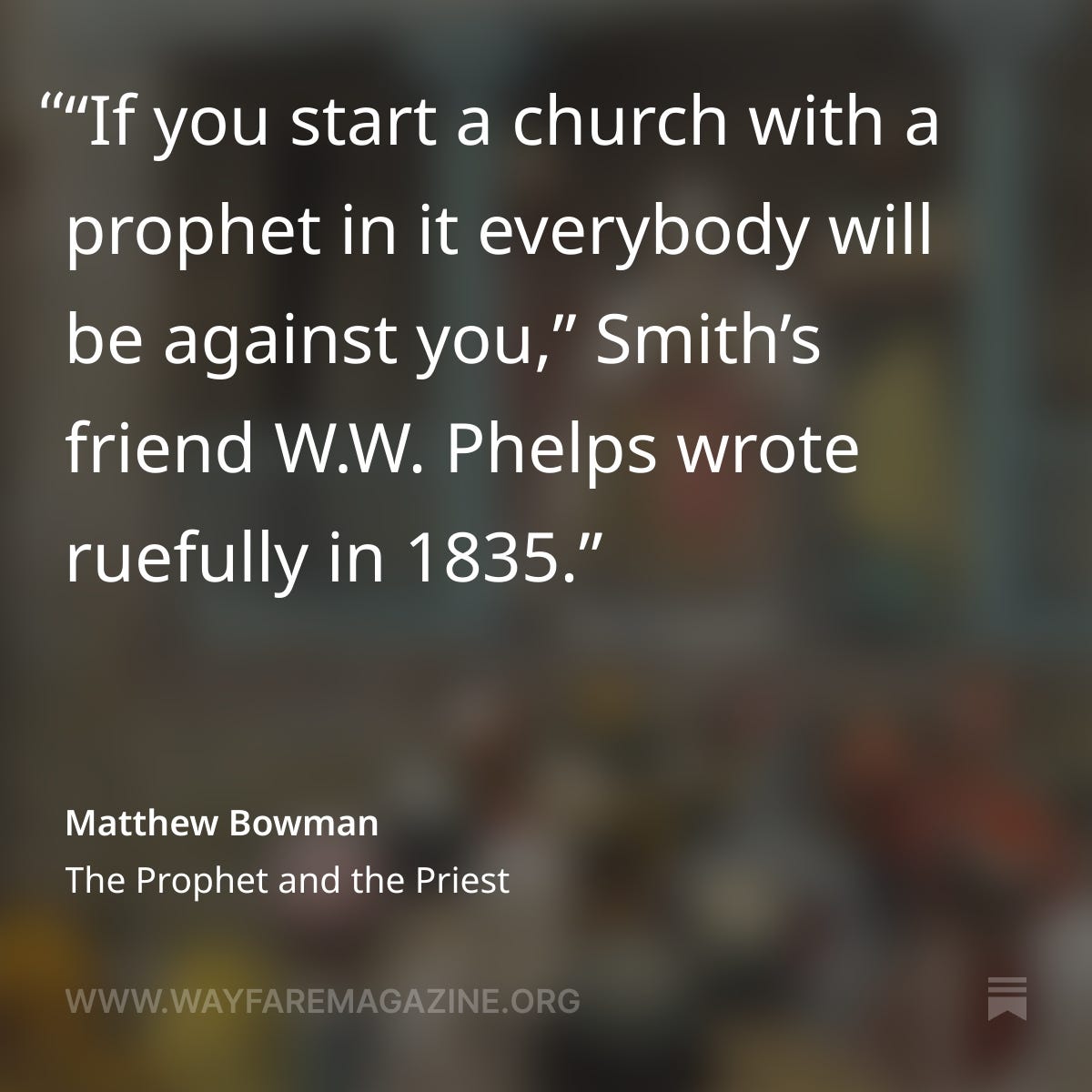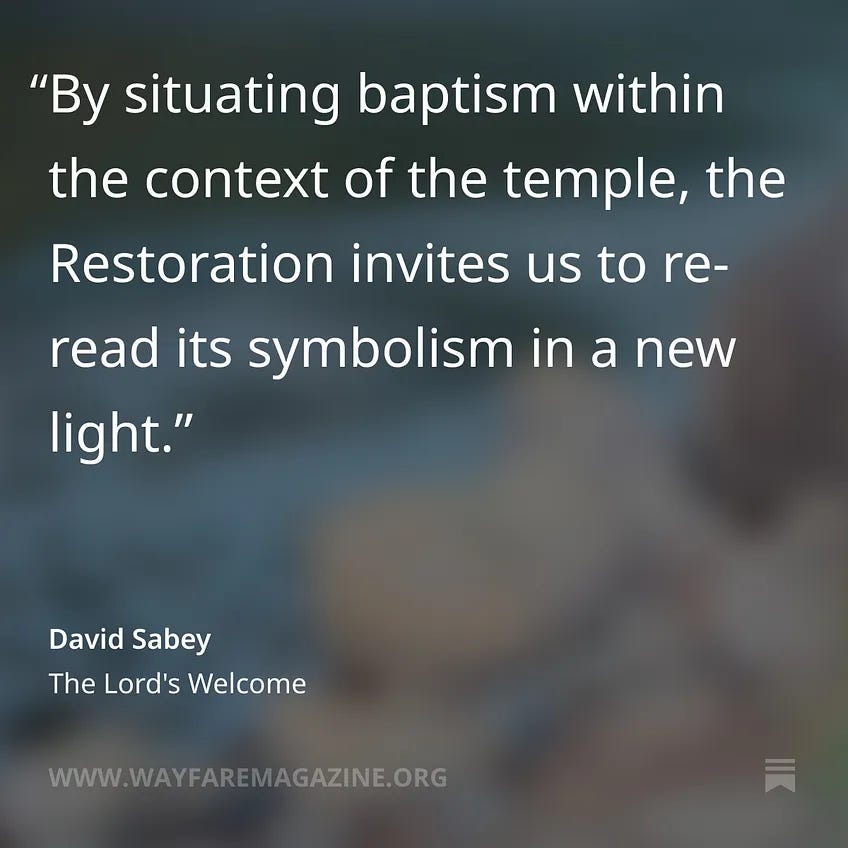How can I deal with imperfections in myself, in others, or in the Church?
Faith Matters resources to accompany your Come Follow Me study: June 23-29

The Lord’s servants speak His will when moved upon by the Holy Ghost.
We sustain the prophets not because of their own merits but insofar and inasmuch as they preach “the word of Christ with unshaken faith in him, relying wholly upon the merits of him who is mighty to save.” (2 Nephi 31:19; see also Moroni 6:4.)
Latter-day Saints are not Smithites, or Nelsonites, or even Mormonites. We are Christians. We look not to our prophets but with them to “Jesus the author and finisher of our faith.”
—Patrick Mason, “Searching for Infallible Prophets?”
What is a prophet, and what is a priest? Why does it matter that the President of the LDS Church is both a prophet and a priest? How can better understanding each of those roles change how we experience our membership in the Church? Learn from Matthew Bowman in “The Prophet and the Priest,” an essay on WayfareMagazine.org:
“Continue in patience.”
Patrick Mason: Imagining a Four-Stage Church
We’ve been thinking and talking a lot recently about a phenomenon that sometimes happens and that we’ve occasionally felt ourselves — something you might call a “spiritual whiplash.” It can happen when we’re really uplifted by something: maybe a book we’ve read, an inspiring group of people we’ve been around, or even a transcendental experience in nature. We’re feeling fed, and our cup is full… but then, we come back down to earth. We’re faced with the realities of the mundane, and the imperfections and humanity of the people all around us, including ourselves.
So — what are we supposed to do when this happens? Is it realistic to expect to stay in this spiritually uplifted state all the time? What about when even our Church meetings don’t feel like they’re recharging our batteries, but instead are draining them? When we’re feeling fed by something, how do we take that feeling with us to share in our everyday settings and communities, rather than resenting the contrast between them? How can we look at members of our communities as God might, rather than judging them for not meeting our standards — or even judging them for what we perceive as them judging us?
Sometimes Jesus says, “Hey, the Kingdom of God is right here! It's with you! You're the Kingdom of God! Huzzah!” Right? And then other times it's like, no, it's on some way distant horizon. And so there's this sense of, it's both already here and it's not yet arrived. And that's the tension that we have to live in as Christians, and it's the tension we live in as Latter-day Saints, too. We both realize there's something special going on, there's something incredible about our community, there's something really great, but it's also not what it's meant to be yet.
…In some ways, you've got to create the church that you want to be a part of, while also participating in a larger Church as well.
—Patrick Mason
I can help center my home on Jesus Christ.
Joseph Grenny: The Honest Truth about our Messy Families
This is a deeply personal and thought-provoking message about family, faith, and the complexity of life from Joseph Grenny, author of Crucial Conversations and co-founder of many organizations, including The Other Side Academy.
Drawing from his own experience with his own “messy” family, Joseph speaks openly about moments of despair, including the heartache of watching loved ones, including his own children, struggle with addiction, estrangement, and other crises.
But at the heart of his message is a radical idea: that the phrase "All is well" can be true even in the face of chaos and imperfection. He challenges the traditional "brochure" image of family success, reminding us that not even the families in our sacred texts had it all together. Through powerful stories of redemption, both from his own family and the lives transformed at The Other Side Academy, Joseph encourages us to rethink what it means to succeed as families, and to embrace waiting as part of God’s divine work.
We think this conversation will resonate deeply with anyone who has felt the pain of seeing a loved one struggle, and we hope it offers both comfort and inspiration.
“True and faithful” friends help me follow Jesus Christ.
Of the many reasons I am a Christian, chief among them is that Jesus invites each one of us, no matter how broken or imperfect, to join his banquet table and become his friend. What does he ask in return? You are my friends if you do what I command. What does he command? Love one another, as I have loved you. To follow Christ is to take friendship seriously. Perhaps more seriously than anything else. Zion, ultimately, is a city of friends, but with friendships deepened by a sacramental relationality enabled by the love of Christ—an alchemy of grace where acquaintances can be transformed into kin. For Latter-day Saints, perhaps our most beautiful doctrine is that families are forever, and so are our friendships. “That same sociality which exists among us here will exist among us there, only it will be coupled with eternal glory.”
—Zachary Davis
I am accountable for the revelations the Lord has given.
In Doctrine and Covenants section 70, the Lord put Joseph Smith, Oliver Cowdery, and others in charge of publishing the revelations that the Church had received through Joseph up to that point. In verses 2 and 3, the Lord says, “I, the Lord, have appointed them, and ordained them to be stewards over the revelations and commandments which I have given . . . and an account of this stewardship will I require of them in the day of judgment” (D&C 70:2–3). This idea of stewardship over spiritual things (as opposed to merely temporal ones) also shows up in the New Testament: in 1 Corinthians 4, Paul writes, “Let a man so account of us, as of the ministers of Christ, and stewards of the mysteries of God” (1 Cor. 4:1).
For me, the concept of spiritual stewardship suggests at least two things: first, it would be wrong to claim ownership over the spiritual gifts we’ve been given, either individually or collectively; and second, all of us are personally responsible to God for how we use the spiritual tools we have access to.
—Peter Mugemancuro
The Doctrine and Covenants teaches me about Jesus Christ.
Adam Miller & Rosalynde Welch: How to Have a Conversation with God
Adam Miller and Rosalynde Welch's book Seven Visions is an exploration of seven visionary experiences in the Doctrine and Covenants—moments where heaven and earth meet in powerful and sometimes surprising ways. Through these visions, Adam and Rosalynde invite us to consider how we engage with scripture and revelation in our own lives.
Adam and Rosalynde suggest that rather than treating scripture as something fixed and unchanging, we can approach it as an active, unfolding conversation. As Rosalynde put it, “The meaning of scripture is not fixed inside the covers of the book, but it unfolds in the space between the reader and the text.” We love their insights about passages of scripture that feel unsettling. Could our discomfort itself be a catalyst for revelation? And could the very questions we feel most compelled to ask be what expands our capacity to recognize Christ as He truly is—and to see the world more as He sees it?
This was such a rich and expansive conversation, and we hope it gives you a new lens for engaging with scripture and revelation.
I can be baptized when I am eight years old.
I was baptized by my dad when I was eight years old. I have a photo of my baptism day, standing in front of the stake center with my family. With the summer sun in my face, I am smiling and squinting. I don’t remember much about that day. I remember a boy in my Primary class also got baptized. And I remember the water was warm. I assume that I was pleased to be making that big step. I made a choice I didn’t remotely understand. But I did it gladly.
Afterwards, I learned more about what this decision meant. I went to Primary and Young Women’s. I learned about the temple and the promises we make there and how everyone would have the chance to be baptized in either this life or the next. I tried to choose the right and sometimes chose wrong. The sacrament was a way to renew the covenants I had made at baptism. These covenants, I learned, were like a two-way contract between us and God. We made promises, and God reciprocated. We lived good lives, and God would eventually welcome us home.
Many years later, though, questions arose. What was it about baptism that made some people fit for heaven and others not? Why require such a seemingly arbitrary entrance requirement for heaven? Sure, there is deep symbolism built into baptism, but wasn’t it still just symbolism? It seemed that when all was said and done, God would be less interested in the symbol and more interested in the real thing—the transformed heart.
While these questions simmered, I heard a Jewish rabbi speak, and something became clear. While this rabbi was only tangentially speaking about covenants, he reframed them for me. He said that he was sometimes asked by people who were not Jewish, “What makes you so special?” The implication was, “What gives you the arrogance to call yourselves a chosen people?” Latter-day Saints could ask themselves this same question: among the billions of people who have lived on earth, why would God give this unique piece of saving information to just a few favorites? Who made us the teacher’s pet?
The rabbi’s response to this question was simple: God chooses those who choose Him.
This felt like a mic drop moment. It was so basic. Could it be that this was the essence of covenant? Fundamentally, it’s not about reciprocal duties, but rather, reciprocal relationship?
And could it be that at the heart of every covenant we make is this one same truth? It’s not just separate and distinct agreements made at baptism, during the sacrament, and in the temple. It’s not a legal contract with pages of clauses. It’s one promise. It’s one choice. It’s saying yes to gracing. Fundamentally, it’s not making covenants (plural), it’s living in covenant (singular). It’s living in Christ.
Baptism is not fundamentally about keeping some people out of heaven and letting others in. The symbol is an invitation. Baptism says, “Salvation is here.” Right now. Enter God’s presence and start living life as it was meant to be lived. Baptism says, “In Christ, your old self has died and your new one has risen.” Don’t wait. Enter into the divine dance now, so that when you mourn with those who mourn, and comfort those who stand in need of comfort, you will do these things differently. You will do them in Christ.
—Hannah Packard Crowther, Gracing











